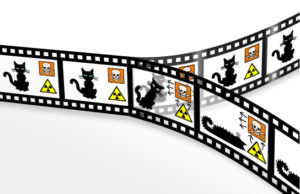The Invited Philosophers
Neil & JP
Menu
- Dinner Main Dish: Grilled chicken, marinated Peruvian “pollo a la brasa” style, with sauteed veggies and potatoes, and a side of mixed greens salad.
- Dessert: Chocolate lava cake with strawberry ice cream
- Drinks: Zolo Wine & Chalk Hill Pinot Noir*
*Courtesy of Neil & JP
The Philosophy
Physicists who study quantum mechanics look for the smallest particles in the universe (atoms, electrons, and photons) to understand its rules. And they have made some extraordinary and mysterious discoveries about it. This article discusses them and asks these questions :
- Does it seem reasonable that a person/scientist can alter a quantum system just by “looking” at it?
- What about creating multiple universes by merely making a decision?
- What if your mind split because you measured a quantum system?
All or some of these things might routinely happen millions of times every day.
We wondered how it affects our lives.
The Summary
Two photons can travel lightyears apart, but they remain linked or “entangled”: The moment photon A is measured as being vertically polarized, photon B instantaneously becomes horizontally polarized, even though B’s state was unspecified a moment earlier and no signal has had time to travel between them. This is the “spooky action” that Einstein was famously skeptical about.
In the double slit experiment, scientists were surprised to discover that firing one electron (1 particle) at a time at a wall with two slits produced the same interference pattern as shining a light at it (light has many particles). It was as if the electron would split. Next, they placed cameras under the slits to see which slit each particle passed through. And that’s the really weird part: the interference pattern disappeared.
Somehow, the very act of looking makes the electrons travel like well-behaved single particles. It’s as if they knew they were being spied on and decided not to be caught in the act of performing weird quantum shenanigans.

(Science Photo Library – Reprinted by BBC)
There are two interpretations of these and other quantum mechanics observations: (1) Copenhagen Interpretation and (2) the Many-Worlds Theory of quantum mechanics. Because quantum mechanics is so strange, nobody knows which one is valid or if there is another interpretation that captures the reality of it.
Analysis
Copenhagen Interpretation vs the Many-Worlds Theory
Erwin Schrödinger developed the wave function equations that describe all possible locations and characteristics of a quantum system as it changes over time. Schrödinger’s cat in a box, which was defined as an answer to Einstein, Podolsky, and Rosen article on quantum superpositions, is a way to explain the superposition of a system, where a cat is in a closed box with a radioactive atom that may kill it. The cat is in a superposition of being both dead and alive at the same time.

(Image by Christian Schirm)
In the Copenhagen interpretation, by opening the box containing Schrödinger’s cat, you cause the wave function to collapse into one of its possible states, either alive or dead.
In the Many-Worlds interpretation, the wave function doesn’t collapse. Instead, all probabilities are realized. In one universe, you see the cat alive, and in another universe, the cat will be dead.
Decisions lead to events that trigger the separation of multiple universes:
We make thousands of big and little choices every day. Have you ever wondered what your life would be like had you made different decisions over the years?
Attention Makes the World, Asking is Observing
I personally live my life according to both theories. I believe that what I focus my attention on, is the equivalent to making a decision and observing a new situation or event, and it becomes my new reality. It always does. It collapses into a new world.
I also believe there are parallel worlds or possibilities out there waiting for me to explore, the moment I decide to observe them.
I told Neil and JP about the problem I have because I feel that I do not have enough time to pay attention to everything and especially people, like my daughter, my partner, my friends, my extended family given that my passion and work in science takes so much of my time. I feel that everything I pay attention to, grows, becomes more real. My focus is on good things and good thoughts as I do not want bad things to grow. I gave the example of my old potted palm tree in my living room, whose leaves turn a deep green when I pay her attention by watering her, removing dry leaves, or even touching her leaves, perhaps even when talking about her. Sometimes I forget about her and her leaves turn dry and yellow. My world turns dry and yellow when I neglect important people or things. JP, who is an artist and is passionate about it and also spends a lot of time with his art, commented that I could ask from other people to be more understanding and giving towards me, versus the other way around of feeling guilty of not giving them enough attention.
I disagreed with him about that, but now I changed my mind.
I believe my attention makes my world a better world, but I feel pressured to give attention to others and to too many things. I do not focus on being understood or on receiving attention from others. I know my world is a good one if other people are happy, and that is all that matters. I should not give in order to receive something back. But maybe there is truth in JP’s comment, and I should learn to ask for understanding. I should not expect to get it or be attached to getting what I ask. But the mere act of asking seems equivalent to the act of observation, because when we get an answer, the wave function collapses, we live in a new world with an answer we did not know before we asked.
Most People do Not have the Luxury of Options
During this dinner we got “entangled” in discussions of our everyday lives and routines. Neil and JP commented that most people don’t have the luxury of “options” in life. Our decisions are often something between a rock and a hard place. I heard something similar during the dinner with Gilles and Pedro. In both cases, they pointed to the things that limit us, our job situation, lack of money, relationship issues, and they argued philosophy is a nice thought experiment that many people do not have the luxury to put into practice.
Is that so?
Many people are too focused on “making a living”, too busy with work that pays their bills to even consider that there is something like Many-Worlds or that they have the luxury of “options”. What options do we have if we are always out of time or money? What options are there if the monotony of everyday chores takes over? And if in your work or life, you interact with difficult people, what options do you have?
Consider this:
Can you extrapolate from quantum mechanics of minuscule particles to big things like people? Can you create a universe in which people become friendly and happy by just observing that side in them? Or by asking them to be friendly? When was the last time you nicely asked an unfriendly person to be friendly? And can you focus on enjoying the routine of life while also looking to observe new options/realities/worlds? Can just the thought that we live in a world of possibilities bring extra happiness to your life? And perhaps bring unexpected happy possibilities?
I say: Try it.
“People who fail to regard the truth seriously in small matters, cannot be trusted in matters that are great.”
― Albert Einstein

